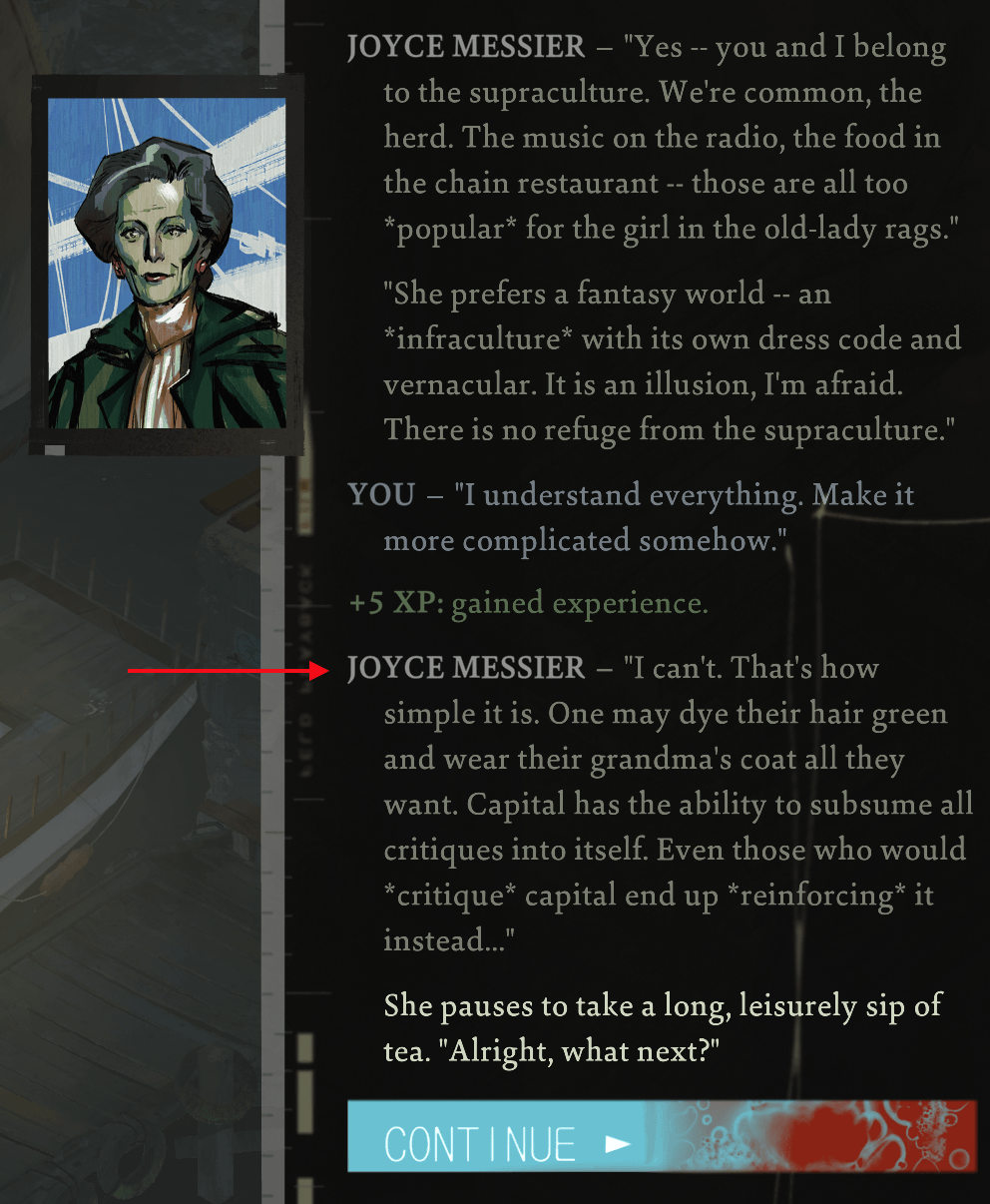someone read adorno
“Capital has the ability to subsume all critiques into itself. Even those who would ‘critique’ capital end up ‘reinforcing’ it instead…”
very true detective
This is why talking about things like government services just wash over conservatives. I was talking about transit and a common reply I get is “it’s not even profitable!”. It’s intrinsically linked that if it doesn’t make money, it’s valueless… it doesn’t matter if people use it, or if people need it, if it breaks even, or even if it’s designed to run at a slight loss because it’s value is more important than profit. People have lost the ability to understand that profit is not always the goal.
It’s because they’re convinced, through their own experience, there isn’t enough money to go around so we have to make more instead of use what we have wisely.
Aka send a plumber to the billionaires
The view that public transport is not profitable because it does not directly turn a profit also completely misses the bigger picture. Imagine in a city where public transport operates at a loss, but provides transportation to and from work for loads of people. Without public transport, they’d have to switch to something like cars, causing congestion, causing delays, causing loss of profit for the city as a whole. Not to mention less time spend with your family or your hobbies, causing unhappiness, decreasing people’s desire to work to the best of their abilities etc etc. I could probably go in quite a while listing things public transport provides that indirectly works in favor of capitalism.
Not to mention the expenses that cities waste on the consequences of cars, like crashes and infrastructure maintenance.
if it breaks even, or even if it’s designed to run at a slight loss because it’s value is more important than profit.
If it breaks even it can sustain itself in a market economy (anything where revenue >= costs can). If it operates at a loss, then someone other than the user is having to pay for it, and that’s usually where you lose them (because generally the answer is that you’re expecting them to pay for it in part, usually through taxes).
This is also why they get so grumpy about things like welfare (especially the ones who are working class and barely getting by) - they actively dislike the idea that they should have to pay for their own food/shelter/etc and also help pay for your food/shelter/etc when things are tight and they’re destroying their work/life balance just to get by and life would be meaningfully easier for them if they weren’t paying as much in taxes (and they grossly overestimate how much tax money goes to SNAP/TANF/etc).
Oh I know that, and the last point is what I try to drive home. That things like transit and food benefits are a fraction of a percentage of their taxes. I did amtrak for someone and realized it was less than 2 dollars a year that the person paid for amtrak, but them talking about it sounded like it was sending them right to the poor house. The military, on the other hand…
When you commodify all the people’s wants and needs, you commodify the people.
What are we to them capitalists but (wage) slaves?
If we are being technical, people were already commodified with the origin of Capitalism. Capitalism requires Labor-Power to be bought and sold as a commodity on the open market, that’s where surplus value extraction comes from.
How do you fight against it?
Buy my anti-capitalism book
And my anti-capitalism axe
They’re taking the hobbits to IPO! To IPO! To IPO!
Tell me, where is Gandalf, for I much desire to speak with him.
“A stock exchange of Mordor…”
How much?
Wait. Before you read their anti-capitalism book, you need to read my ‘How to Read Anti-capitalism Books’ book. If you act quickly we can get a BOGO offer with both books for only 3 easy payments of $19.95.
On a larger scale? Through organizing and engaging in communities, politics and unions. No one can stop it alone.
On a personal scale?
Stop consuming more than you need. Maintain what you already own. Don’t buy it because it’s better than what you have, if what you have is already good enough. Buy second hand when you can. Lend and loan with friends when it comes to seldomly used tools.Buy maintainable stuff instead of the cheap copy that has no repairability (Think of the boots theory and don’t get tricked into spending more in the long term just to spend less now).
And the hardest bit would be to stop comparing yourself and your life with that of those around you, I think that the rat race is the main driver of consumption together with all that wealth peacocking.
And please go vegan. Exploiting and murdering sentient beings by the billions in an industry too gruesome to look at because you are accustomed to a taste is peak capitalist cynicism.
I rely too much on meat for protein with my autoimmune disease (can’t eat a lot of plant-based proteins). That being said, the moment they start padding ground meat with bugmeal, or better yet lab grown meat, hits store shelves I’ll be happy to pay extra for that.
Organizing. The working class’s greatest strength is that production under Capitalism readily makes the working class familiar with how to run society and organize even without a ruling class. Reading theory helps greatly as well, If you want an intro Marxist-Leninist reading list, I made one you can check out here.
My personal take:
No thanks! is the most powerful thing you can say. Don’t engage, stop buying endless toys and distractions, build a local community, hang out with real people in reality, share stuff and be kind. Maybe blow up a pipeline too.Edit: I didn’t see the comment below, it’s much better!
If a system needs constant growth to survive it will eventually collapse.
Finally YOLO makes sense. Yes, capitalism indeed only lives once. It will have its lifetime, and then it will collapse and be done with. It will not come back, it will not be reborn.
So long as we stick with our distinctions of “Mine” and “Thine”, we will fall into a different sort of capitalism later down the road. In order to keep it away we need to stop looking at wealth as a virtue, but as something to give away.
Not the greatest dude, but had a sick quote that sums up this post:
“The Capitalists will sell us the rope with which we will hang them” - Vladimir Lenin
I also like “My death comes by a thousand cuts, and I paid for the knife” - Dopamine by The Arcadian Wild
To piggyback off your comment, a thread from Existential Comics:
I highly recommend reading this thread. If you want an intro Marxist-Leninist reading list, I made one you can check out here.
“A film like Wall-E exemplifies what Robert Pfaller has called ‘interpassivity’: the film performs our anti-capitalism for us, allowing us to continue to consume with impunity. The role of capitalist ideology is not to make an explicit case for something in the way that propaganda does, but to conceal the fact that the operations of capital do not depend on any sort of subjectively assumed belief. It is impossible to conceive of fascism or Stalinism without propaganda - capitalism can proceed perfectly well, in some ways better, without anyone making a case for it.”
– Capitalist Realism, Mark Fisher
Drag doesn’t believe in money. What’s capital gonna do about that?

I haven’t played it, but is this disco elesium?
yep
Certified Mark Fisher moment.
ROFL imagine thinking punk rock is striking against the system.
I’ve always believed that capitalism is the default state of human exchange and the opposite of capitalism which I define tersely as empathy at scale takes effort.
Capitalism ≠ commerce
But capitalism is basically greed refined by scientific logic.
Even Adam “the Father of Capitalism,” Smith said in The Theory of Moral Sentiments that once capital has ammased enough wealth to be thinking about buying the courts and the governments, it would be time to transition away from capitalism to a more natural and equitable system, whatever that may be.
I’m reasonably certain he would have been screaming for a socialist if not communist revolution back in the gilded age.
Capitalism is only a few hundred years old. Trade predates Capitalism. It doesn’t have an “opposite,” rather it’s just another Mode of Production, of which there have been many and there will be more to supercede it.
Infinite growth in a finite system is the definition of cancer. And like a cancer it will keep poisoning us, and must be cut out and eradicated.
Capitalism made a treatment for the cancer.
Capitalism took cancer research, funded by taxpayers and performed by graduate students and post docs for no profit, slapped a hefty price tag on it for the public, then called it “innovation” to justify the insane amount of money they were able to extract from the masses (the same masses rhat originally funded that research).
Create a problem then sell the solution. Simple as
Sell the revolution.
How much would people pay for communism, how much for other forms of government?
The Black Mirror episode “Fifteen Million Merits” makes this point in a (typically) very chilling way.
Imagine watching that episode then going to a desk/office/cubicle job 5 days a week without going insane. Must take a shit ton of cognitive dissonance and shamelessness to voluntarily work for capitalists.
Well, things would exist whether you’re in a capitalist economic system or not. People would make music and label their genre. People would write books and want to sell them. The real difference is who gets the profits.
I mean without capitalism they wouldn’t have the concept of selling, so probably not.
I love how you take the definition of relationship to labour, and make it about market places that have existed long before capitalism has.
Sure, sort of. Commodity production, ie the production of goods purely in order to sell and make a profit, likely won’t last forever, especially as the rate of profit trends towards 0.

We can clearly observe the shift from genuine productivity to increasingly financialized Capital, which is an inherently unsustainable model.
You say that likes it’s a bug, not a feature.
I say it like it’s a symptom of the unsustainability of it all.
It’s also how driven the profits are. All the choices on the way, are they directed for maximum profit or for good. And many things that are made didn’t need to be made, and wouldn’t if people didn’t care to buy them. The effort instead could have gone into good things.














